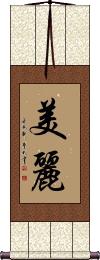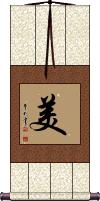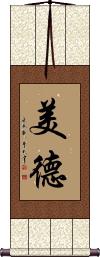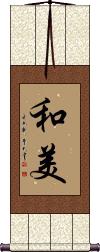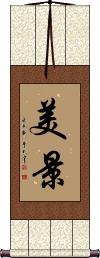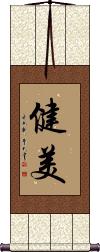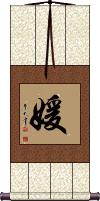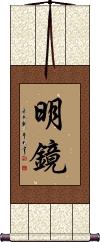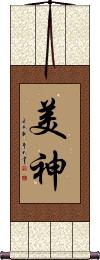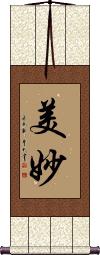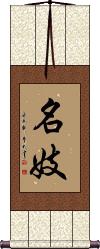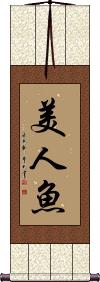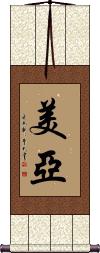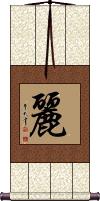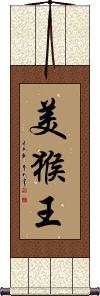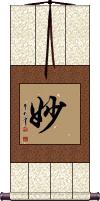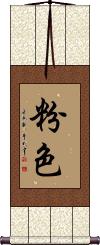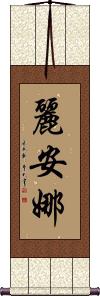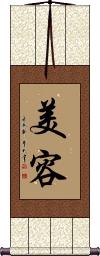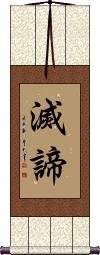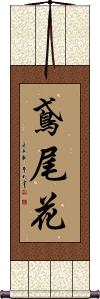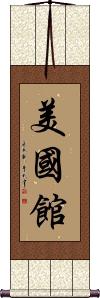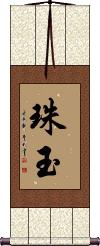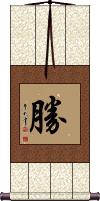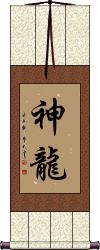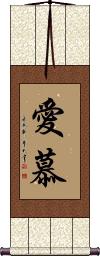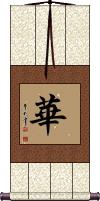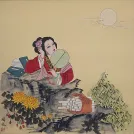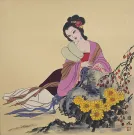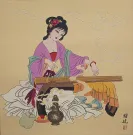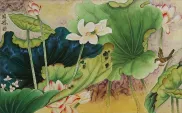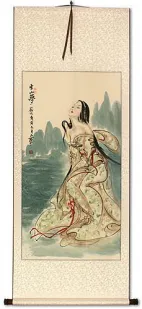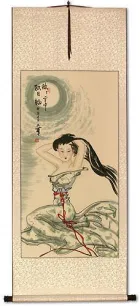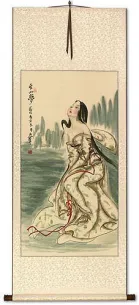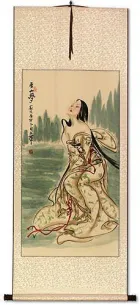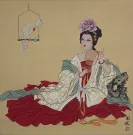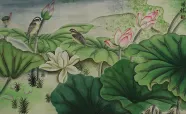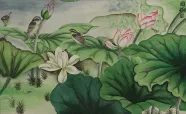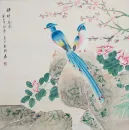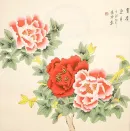Many custom options...
And formats...

Not what you want?
Try other similar-meaning words, fewer words, or just one word.
Beautiful Chinese in Chinese...
Buy a Beautiful Chinese calligraphy wall scroll here!
Personalize your custom “Beautiful Chinese” project by clicking the button next to your favorite “Beautiful Chinese” title below...
1. Beautiful
2. Beautiful Heart / Beautiful Spirit
3. Beauty / Beautiful / Handsome
6. Beautiful Life / Life in Perfect Harmony
12. Beautiful Mind
14. Beauty / Beautiful Princess
17. Goddess of Beauty / Beautiful Spirit
18. Elegant / Exquisite / Grace
19. Eternal Beauty
20. The Good Life / Beautiful Life
21. Life is Good / Life is Beautiful
22. Geisha of Unequaled Talent
23. Mermaid
24. Meiya
25. Lee
26. Monkey King
27. Clever / Superb / Wonderful
28. Pink Color
29. Leanna
31. Beauty: The art of makeup / cosmetics
32. Four Noble Truths: Elimination of Desire or Attachment
33. Iris Flower
34. Mi Guk Kwan
35. Gem
36. Win / Victory
37. Shen Long
38. Adoring Love
39. You are always a beauty in your lover’s eyes
40. Flowers / Blooming / Splendid / China
41. Flower in the Mirror, Moon on Water
42. Mark the boat to find the lost sword / Ignoring the changing circumstances of the world
Beautiful
美麗 is a two-character word used often in Chinese, old Korean, and ancient Japanese to express beauty.
I've had a few requests for a “two-character beautiful,” and this is by far the best word. This is not a common word for an Asian person to want on a wall scroll. However, you will see it commonly used as an adjective in phrases, stories, and titles throughout magazines and signage in China.
美麗 can also be translated as gorgeous or lovely.
Note: 美麗 is not commonly used in modern Japan.
Beautiful Heart / Beautiful Spirit
Beauty / Beautiful / Handsome
美 is often used to describe the beauty of a woman.
However, when applied to a man, it can mean handsome. It's also the first character in the word for “beauty salon” which you will see all over China and Japan.
This can be used as the given name for a girl (spell it or say it as “Mei” or “May”).
For a bit of trivia: The title for the “USA” in Chinese is “Mei Guo” which literally means “Beautiful Country.” This name was bestowed at a time before Chairman Mao came to power and decided that China didn't like the USA anymore (even though we fought together against the Japanese in WWII). But these days, Chinese people love Americans (but have a distaste for American politics and policy). But I digress...
美 is also how “Beautiful” is written in Japanese Kanji and Korean Hanja. 美 can also mean: very satisfactory; good; to be pleased with oneself; abbreviation for the USA; fine; handsome; admirable; madhura; sweet; and/or pleasant.
See Also: Beautiful Woman | Beautiful Girl
Beautiful Soul
Beautiful Virtue
美德 written in Chinese or Korean Hanja can also mean “grace of character” or “noble virtue.”
![]() There is a slight variation in the modern Japanese Kanji form of the second character. If you want the modern Japanese version, please click on the special Kanji shown to the right instead of the button above. Note that the traditional Chinese form is still readable and understood by Japanese people (
it’s
the ancient Japanese form anyway).
There is a slight variation in the modern Japanese Kanji form of the second character. If you want the modern Japanese version, please click on the special Kanji shown to the right instead of the button above. Note that the traditional Chinese form is still readable and understood by Japanese people (
it’s
the ancient Japanese form anyway).
Beautiful Life / Life in Perfect Harmony
和美 is a word that means “harmonious” or, “in perfect harmony.”
The deeper meaning or more natural translation would be something like, “beautiful life.”
The first character means peace and harmony.
The second character means beautiful. But in this case, when combined with the first character, beautiful refers to being satisfied with what you have in your life. This can be having good relations, good feelings, comfort, and having enough (with no feeling of wanting).
Note: In Japanese, this is often used as the name "Wami." This title is probably more appropriate if your audience is Chinese.
Beautiful Girl
美麗的姑娘 is the best way to express “beautiful girl” in Chinese.
See Also: Beautiful Woman | Beauty
Beautiful Woman
美麗的女人 is the best and most polite way to express “beautiful woman” in Chinese.
Note: Some people may like the simple 2-character 美女 way to express this, but there are some bad connotations with that, so better to stay with this longer and more respectful title.
See Also: Beautiful Girl | Beauty
Beautiful Sight
美景 can be translated as a beautiful view, beautiful scenery, or a beautiful sight.
Note: Not a commonly used word in modern Japanese.
Beautiful Dreamer
Beautiful Princess
美麗的公主 is how to write beautiful princess in Chinese.
The first two characters mean feminine beauty or rather a way to say beautiful that only applies to women. The middle character is just a connecting character. The last two characters mean princess.
See Also: Queen
Beautiful Mind
Strong and Beautiful
We don't really have a word like 健美 in English, but these two characters create a word that means “strong and beautiful.” It could also be translated as “healthy and beautiful.”
Note: 健美 is a word in Chinese and Korean, but it's also the family name Takemi in Japanese. The characters hold the same meaning in Japanese; however, it's like having the English name Stillwell when few people would perceive the meanings of still and well.
Beauty / Beautiful Princess
媛 means, a beauty; beautiful (woman); princess; a young lady of noble birth; girl; small & lovely.
媛 is used a bit more commonly in Chinese than in Japanese.
Note: This can be the female given name "Hime" in Japanese.
Beautiful Woman Proverb
沈魚落雁 is an old proverb that literally means “fish sink, goose alights.”
...But this takes some explaining. This is a proverb from Zhuangzi (莊子), who lived in the late 4th century BC.
This figuratively refers to female beauty that is so captivating that even the birds and beasts take notice.
Perhaps a better and more accurate way to describe this is to say that it speaks of the charms of a uniquely beautiful woman who is so beautiful that fish stay on the bottom of the water and flying wild geese fall from the sky in shame.
This proverb is so famous that it is also known and used in Japan (same characters, different pronunciation).
Note: This can also be written 沉魚落雁 instead of 沈魚落雁 (just the first character varies slightly).
Mirror: Beautiful Clarity
While 明鏡 means mirror in Chinese, Japanese Kanji, and old Korean Hanja, it's commonly used as a metaphor for something beautiful and bright or something that provides clarity and insight.
Goddess of Beauty / Beautiful Spirit
In Chinese, 美神 means Goddess of Beauty.
The first character means beauty or beautiful.
The second character means spirit (can also mean god, goddess, or soul).
Some will use this as a short way to say, “Beautiful Spirit.”
This has a similar meaning in Japanese but is used more often as a female given name in Japan. As a Japanese given name, it can be pronounced Mikami, Mikan, or Binasu.
Elegant / Exquisite / Grace
Beyond elegant and exquisite elegance, 美妙 is also the word used to say “beautiful” or “marvelous” when referring to a work of art.
Can also be translated as exquisiteness, gracefulness.
Note: Not a commonly used word in Japanese.
Eternal Beauty
The Good Life / Beautiful Life
Life is Good / Life is Beautiful
Geisha of Unequaled Talent
(Danger: Can mean prostitute!)
In Japanese, 名妓 means “distinguished/talented/beautiful geisha.”
The meaning in Chinese (and the deeper meaning in Japanese) would be “distinguished/talented/beautiful prostitute.”
I am not sure that our master calligrapher will even write this, so please note that fact if you decide to place the order. Of course, we'll refund your money if he refuses.
Mermaid
Meiya
This is the most common transliteration to Mandarin Chinese for the feminine western name Lee.
麗 means “pretty” or “beautiful.”
Note: This can sometimes be used as a female given name in China. It is not the only given name that sounds like Lee or Li in China. For instance, this is a completely different character than the one used for Bruce Lee’s name.
Monkey King
美猴王 is the specific title for “Monkey King.”
A character made famous by the ancient novel Journey to the West.
It literally means “Handsome/Beautiful Monkey King.”
See Also: Monkey Fist | Drunken Monkey
Clever / Superb / Wonderful
The meanings for 妙 include: clever; wonderful; strange; unusual; superb; excellent; beautiful; mystic; supernatural; profound; mysterious; good; surpassing; fine, lovely, charming; special; outstanding; incomparable.
As you can see, this single character can mean a lot of things (a bit ambiguous).
Pink Color
Leanna
Truth Goodness and Beauty
Beauty: The art of makeup / cosmetics
In Chinese, 美容 is the title for the art of beauty, as applying makeup or cosmetics to enhance beauty.
Note: In Japanese and Korean, this takes the meaning of beautiful face or beauty of figure or form. Be sure you know who your audience is and have matched the desired meaning.
Four Noble Truths: Elimination of Desire or Attachment
Nirodha
滅諦 suggests that once you eliminate desire or attachment to worldly things, only then can you achieve enlightenment.
Realize that things are impermanent. That fancy car, beautiful spouse, big house, and impressive career are things you can't take with you. These things are a flash in the pan compared to the infinite span of history, generations to come, time, and space.
This term is exclusively used by devout Buddhists. It is not a common term, and is remains an unknown concept to most Japanese, Korean, and Chinese people.
See Also: Buddhism | Enlightenment
Iris Flower
鳶尾花 is the title for the iris flower in Chinese and Japanese.
If your name happens to be Iris, this is a beautiful way to express your name by meaning in both of these languages (it will mean your name but not sound like your name).
Can also mean wall iris, roof iris, or Iris tectorum.
Note: There are other titles for specific iris varieties - contact us if you need something special.
Mi Guk Kwan
American School
美國館 is a Korean Hanja title, which roughly means “U.S. School.”
The first two characters mean “USA” (literally: Beautiful Kingdom/Country).
The last character means “school,” “building,” and “schoolroom” in this context.
This “Mi Guk Kwan” title is used to mean “The American School of Tang Soo Do.”
If you want this in modern Korean Hangul, just click the Hangul characters in the pronunciation box next to the Korean flag above.
珠玉 is a Chinese, Japanese Kanji, and old Korean Hanja word meaning gem.
Beyond just the word gem, this can refer to pearls and jades, jewels, clever remarks, beautiful writing, gems of wisdom, genius, or an outstanding person.
If your name is Gem, this is a nice way to represent your name in 3 Asian languages. Though the pronunciation will be far from Gem, the meaning of gem is really nice.
Note: In Japanese, this is sometimes used as the female given name, Tama.
Win / Victory
勝 is a single character that means to win or be victorious.
This can also be translated: To overcome; success; to beat; to defeat; to surpass; superior to; to get the better of; better than; surpassing; superb.
In another context, this can mean beautiful (scenery); scenic spot; or scenic beauty.
In Taiwanese Mandarin, this can be pronounced with the first tone (sheng1) and mean: Able to bear; equal to (a task).
In Japan, this can also be the name Masaru.
In Korea, this has the same meaning but can also be the surname Sŭng.
Shen Long
神龍 or Shen Long literally means “god dragon” or “divine dragon.”
神龍 is a spiritual dragon from Chinese mythology that controls wind, storms, clouds, and rain. Historically, farmers in China avoid offending this dragon, as it could result in a drought or flooding of their fields.
Shen Long has blue/azure scales and appears on the beautiful robes of some Chinese emperors.
Sometimes romanized as Shen Lung and sometimes written as 神竜 in Japan with the pronunciation of Shinryū or Shenron. It can also be a given name in Japan.
Adoring Love
愛慕 means “adoring love” in Chinese, Japanese, and Korean.
I suppose this is the best kind of love to have. 愛慕 has the common character for love. But the second character modifies and reinforces the meaning to become adore, adoring love, or to love and adore.
Ancient Chinese warning:
Adoring someone is fine until you are in the shoes of the Prince of the Kingdom of Wu. This Prince adored a certain beautiful woman (Xi Shi) so much that he neglected his duties and soon let the kingdom fall into ruins.
You are always a beauty in your lover’s eyes
Any woman with affection for Asian art will love a gift of this Chinese proverb calligraphy on a wall scroll.
She will melt in your arms as you tell her the meaning of these characters.
Contained in this phrase is a reference to the most beautiful woman in Chinese history. Her name was Xi Shi, and she was known to have good looks that need not have fine robes or makeup. Her charms were so powerful that she brought down an entire kingdom (in a successful effort to bring honor and pride back to her people).
情人眼里出西施 is a great way to express that the woman in your life is your one love.
Flowers / Blooming / Splendid / China
華 means blooming flowers or splendid China.
華 is really open to interpretation. 華 meant flowers or blooming in ancient China. It still has that meaning in Japanese, and Buddhist contexts.
In modern China, this means glorious, beautiful, splendid, magnificent, or the best part of something. It can also refer to the country of China or something Chinese (such as people - overseas Chinese are often called “hua ren”). 華 is also a surname in China.
In Japanese, this can be the female given name “Ririka.” It's also the short name for a certain kind of playing cards in Japan.
In Korean, This can be the surname “Hwa.” While it also means splendid, flowery, or the country of China in Korean.
Flower in the Mirror, Moon on Water
鏡花水月 is an old Asian proverb that means “flowers in a mirror and the moon reflected in the lake” or “flowers reflected on a mirror and the moon reflected on the water's surface.”
Literally, 鏡花水月 reads “Mirror Flower, Water Moon.”
Figuratively this can be used to represent a lot of different ideas. It can be used to express an unrealistic rosy view or viewing things through rose-tinted spectacles. So you can use it to relay an idea about something that is visible but has no substance,
something that can be seen but not touched, or something beautiful but unattainable such as dreams or a mirage.
This expression is used to describe things like the subtle and profound beauty of poems that cannot be described in words.
鏡 = Mirror (or lens)
花 = Flower(s)
水 = Water
月 = Moon
Can also be written 水月鏡花 (just a slight change in word/character order).
Mark the boat to find the lost sword / Ignoring the changing circumstances of the world
刻舟求劍 is an originally-Chinese proverb that serves as a warning to people that things are always in a state of change.
Thus, you must consider that and not depend on the old ways or a way that may have worked in the past but is no longer valid.
This idiom/proverb comes from the following story:
A man was traveling in a ferry boat across a river. With him, he carried a treasured sword. Along the way, the man became overwhelmed and intoxicated by the beautiful view and accidentally dropped his prized sword into the river. Thinking quickly, he pulled out a knife and marked on the rail of the boat where exactly he had lost his sword.
When the boat arrived on the other side of the river, the man jumped out of the boat and searched for his sword right under where he'd made the mark. Of course, the boat had moved a great distance since he made the mark, and thus, he could not find the sword.
While this man may seem foolhardy, we must take a great lesson from this parable: Circumstances change, so one should use methods to handle the change. In modern China, this is used in business to mean that one should not depend on old business models for a changing market.
This proverb dates back to the Spring and Autumn period (770–476 BC) of the territory now known as China. It has spread and is somewhat known in Japan and Korea.
Broken Mirror Rejoined
Used in modern times for divorced couples that come back together
破鏡重圓 is about a husband and wife who were separated and reunited.
About 1500 years ago in China, there lived a beautiful princess named Le Chang. She and her husband Xu De Yan loved each other very much. But when the army of the Sui Dynasty was about to attack their kingdom, disposed of all of their worldly possessions and prepared to flee into exile.
They knew that in the chaos, they might lose track of each other, so the one possession they kept was a bronze mirror which is a symbol of unity for a husband and wife. They broke the mirror into two pieces, and each of them kept half of the mirror. They decided that if separated, they would try to meet at the fair during the 15th day of the first lunar month (which is the lantern festival). Unfortunately, the occupation was brutal, and the princess was forced to become the mistress of the new commissioner of the territory, Yang Su.
At the Lantern Festival the next year, the husband came to the fair to search for his wife. He carried with him his half of the mirror. As he walked through the fair, he saw the other half of the mirror for sale at a junk market by a servant of the commissioner. The husband recognized his wife's half of the mirror immediately, and tears rolled down his face as he was told by the servant about the bitter and loveless life that the princess had endured.
As his tears dripped onto the mirror, the husband scratched a poem into his wife's half of the mirror:
You left me with the severed mirror,
The mirror has returned, but absent are you,
As I gaze in the mirror, I seek your face,
I see the moon, but as for you, I see not a trace.
The servant brought the inscribed half of the mirror back to the princess. For many days, the princess could not stop crying when she found that her husband was alive and still loved her.
Commissioner Yang Su, becoming aware of this saga, realized that he could never obtain the princess's love. He sent for the husband and allowed them to reunite.
This proverb, 破鏡重圓, is now used to describe a couple who has been torn apart for some reason (usually divorce) but have come back together (or remarried).
It seems to be more common these days in America for divorced couples to reconcile and get married to each other again. This will be a great gift if you know someone who is about to remarry their ex.
This in-stock artwork might be what you are looking for, and ships right away...
Tang Dynasty Beautiful Chinese Woman Painting
Discounted Blemished
Gallery Price: $107.00
Your Price: $59.00
Asian Beauty
Beautiful Chinese Woman Painting
Discounted Blemished
Gallery Price: $89.00
Your Price: $49.00
Beautiful Chinese Woman Modern Art Painting
Discounted Blemished
Gallery Price: $31.00
Your Price: $17.00
Asian Beauty
Classic Beautiful Chinese Woman Painting
Discounted Blemished
Gallery Price: $89.00
Your Price: $49.00
Gallery Price: $353.00
Your Price: $195.88
Gallery Price: $198.00
Your Price: $109.77
Gallery Price: $200.00
Your Price: $88.88
Gallery Price: $200.00
Your Price: $79.88
Gallery Price: $200.00
Your Price: $79.88
Gallery Price: $268.00
Your Price: $148.88
The following table may be helpful for those studying Chinese or Japanese...
| Title | Characters | Romaji (Romanized Japanese) | Various forms of Romanized Chinese | |
| Beautiful | 美麗 美丽 | birei | měi lí / mei3 li2 / mei li / meili | |
| Beautiful Heart Beautiful Spirit | 美麗的心靈 美丽的心灵 | měi lì de xīn líng mei3 li4 de xin1 ling2 mei li de xin ling meilidexinling | mei li te hsin ling meilitehsinling |
|
| Beauty Beautiful Handsome | 美 | bi | měi / mei3 / mei | |
| Beautiful Soul | 美麗的靈魂 美丽的灵魂 | měi lì de líng hún mei3 li4 de ling2 hun2 mei li de ling hun meilidelinghun | mei li te ling hun meilitelinghun |
|
| Beautiful Virtue | 美德 美德 / 美徳 | bitoku | měi dé / mei3 de2 / mei de / meide | mei te / meite |
| Beautiful Life Life in Perfect Harmony | 和美 | wa mi / wami | hé měi / he2 mei3 / he mei / hemei | ho mei / homei |
| Beautiful Girl | 美麗的姑娘 美丽的姑娘 | měi lì de gū niang mei3 li4 de gu1 niang mei li de gu niang meilideguniang | mei li te ku niang meilitekuniang |
|
| Beautiful Woman | 美麗的女人 美丽的女人 | měi lì de nǚ rén mei3 li4 de nv3 ren2 mei li de nv ren meilidenvren | mei li te nü jen meilitenüjen |
|
| Beautiful Sight | 美景 | bi kei / bikei | měi jǐng / mei3 jing3 / mei jing / meijing | mei ching / meiching |
| Beautiful Dreamer | 美麗的夢神 美丽的梦神 | měi lì de mèng shén mei3 li4 de meng4 shen2 mei li de meng shen meilidemengshen | mei li te meng shen meilitemengshen |
|
| Beautiful Princess | 美麗的公主 美丽的公主 | měi lì de gōng zhǔ mei3 li4 de gong1 zhu3 mei li de gong zhu meilidegongzhu | mei li te kung chu meilitekungchu |
|
| Beautiful Mind | 美麗心靈 美丽心灵 | měi lì xīn líng mei3 li4 xin1 ling2 mei li xin ling meilixinling | mei li hsin ling meilihsinling |
|
| Strong and Beautiful | 健美 | takemi | jiàn měi / jian4 mei3 / jian mei / jianmei | chien mei / chienmei |
| Beauty Beautiful Princess | 媛 | hime / haru | yuàn / yuan4 / yuan | yüan |
| Beautiful Woman Proverb | 沈魚落雁 沈鱼落雁 | chin gyo raku gan chingyorakugan | chén yú luò yàn chen2 yu2 luo4 yan4 chen yu luo yan chenyuluoyan | ch`en yü lo yen chenyüloyen chen yü lo yen |
| Mirror: Beautiful Clarity | 明鏡 明镜 | mei kyou / meikyou / mei kyo | míng jìng ming2 jing4 ming jing mingjing | ming ching mingching |
| Goddess of Beauty Beautiful Spirit | 美神 | mikami | měi shén / mei3 shen2 / mei shen / meishen | |
| Elegant Exquisite Grace | 美妙 | bimyou / bimyo | měi miào / mei3 miao4 / mei miao / meimiao | |
| Eternal Beauty | 永恆的美 永恒的美 | yǒng héng de měi yong3 heng2 de mei3 yong heng de mei yonghengdemei | yung heng te mei yunghengtemei |
|
| The Good Life Beautiful Life | 美好的生活 | měi hǎo de shēng huó mei3 hao3 de sheng1 huo2 mei hao de sheng huo meihaodeshenghuo | mei hao te sheng huo meihaoteshenghuo |
|
| Life is Good Life is Beautiful | 生活美好 | shēng huó měi hǎo sheng1 huo2 mei3 hao3 sheng huo mei hao shenghuomeihao | ||
| Geisha of Unequaled Talent | 名妓 | mei gi / meigi | míng jì / ming2 ji4 / ming ji / mingji | ming chi / mingchi |
| Mermaid | 美人魚 美人鱼 | měi rén yú mei3 ren2 yu2 mei ren yu meirenyu | mei jen yü meijenyü |
|
| Meiya | 美亞 美亚 | měi yà / mei3 ya4 / mei ya / meiya | ||
| Lee | 麗 丽 | lì / li4 / li | ||
| Monkey King | 美猴王 | měi hóu wáng mei3 hou2 wang2 mei hou wang meihouwang | ||
| Clever Superb Wonderful | 妙 | myou / myo | miào / miao4 / miao | |
| Pink Color | 粉色 | fěn sè / fen3 se4 / fen se / fense | ||
| Leanna | 麗安娜 丽安娜 | lì ān nà li4 an1 na4 li an na lianna | ||
| Truth Goodness and Beauty | 真善美 | shin zen bi shinzenbi | zhēn shàn měi zhen1 shan4 mei3 zhen shan mei zhenshanmei | chen shan mei chenshanmei |
| Beauty: The art of makeup cosmetics | 美容 | biyou / biyo | měi róng / mei3 rong2 / mei rong / meirong | mei jung / meijung |
| Four Noble Truths: Elimination of Desire or Attachment | 滅諦 灭谛 | mettai | miè dì / mie4 di4 / mie di / miedi | mieh ti / miehti |
| Iris Flower | 鳶尾花 鸢尾花 | ichi hatsu hana ichihatsuhana | yuān wěi huā yuan1 wei3 hua1 yuan wei hua yuanweihua | yüan wei hua yüanweihua |
| Mi Guk Kwan | 美國館 美国馆 | měi guó guǎn mei3 guo2 guan3 mei guo guan meiguoguan | mei kuo kuan meikuokuan |
|
| Gem | 珠玉 | shugyoku | zhū yù / zhu1 yu4 / zhu yu / zhuyu | chu yü / chuyü |
| Win Victory | 勝 胜 | shou / sho | shèng / sheng4 / sheng | |
| Shen Long | 神龍 | shenron / shinryuu shenron / shinryu | shén lóng shen2 long2 shen long shenlong | shen lung shenlung |
| Adoring Love | 愛慕 爱慕 | ai bou / aibou / ai bo | ài mù / ai4 mu4 / ai mu / aimu | |
| You are always a beauty in your lover’s eyes | 情人眼里出西施 | qíng rén yǎn lǐ chū xī shī qing2 ren2 yan3 li3 chu1 xi1 shi1 qing ren yan li chu xi shi qingrenyanlichuxishi | ch`ing jen yen li ch`u hsi shih chingjenyenlichuhsishih ching jen yen li chu hsi shih |
|
| Flowers Blooming Splendid China | 華 华 | ririka | huá / hua2 / hua | |
| Flower in the Mirror, Moon on Water | 鏡花水月 镜花水月 | kyou ka sui getsu kyoukasuigetsu kyo ka sui getsu | jìng huā shuǐ yuè jing4 hua1 shui3 yue4 jing hua shui yue jinghuashuiyue | ching hua shui yüeh chinghuashuiyüeh |
| Mark the boat to find the lost sword Ignoring the changing circumstances of the world | 刻舟求劍 刻舟求剑 | kokushuukyuuken kokushukyuken | kè zhōu qiú jiàn ke4 zhou1 qiu2 jian4 ke zhou qiu jian kezhouqiujian | k`o chou ch`iu chien kochouchiuchien ko chou chiu chien |
| Broken Mirror Rejoined | 破鏡重圓 破镜重圆 | pò jìng chóng yuán po4 jing4 chong2 yuan2 po jing chong yuan pojingchongyuan | p`o ching ch`ung yüan pochingchungyüan po ching chung yüan |
|
| In some entries above you will see that characters have different versions above and below a line. In these cases, the characters above the line are Traditional Chinese, while the ones below are Simplified Chinese. | ||||
Successful Chinese Character and Japanese Kanji calligraphy searches within the last few hours...
